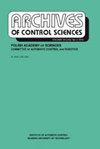Self-improving Q-learning based controller for a class of dynamical processes
IF 1.1
4区 计算机科学
Q4 AUTOMATION & CONTROL SYSTEMS
引用次数: 1
Abstract
This paper presents how Q-learning algorithm can be applied as a general-purpose selfimproving controller for use in industrial automation as a substitute for conventional PI controller implemented without proper tuning. Traditional Q-learning approach is redefined to better fit the applications in practical control loops, including new definition of the goal state by the closed loop reference trajectory and discretization of state space and accessible actions (manipulating variables). Properties of Q-learning algorithm are investigated in terms of practical applicability with a special emphasis on initializing of Q-matrix based only on preliminary PI tunings to ensure bumpless switching between existing controller and replacing Q-learning algorithm. A general approach for design of Q-matrix and learning policy is suggested and the concept is systematically validated by simulation in the application to control two examples of processes exhibiting first order dynamics and oscillatory second order dynamics. Results show that online learning using interaction with controlled process is possible and it ensures significant improvement in control performance compared to arbitrarily tuned PI controller.一类动态过程的自改进q学习控制器
本文介绍了如何将q -学习算法作为一种通用的自改进控制器应用于工业自动化中,作为传统PI控制器的替代,该控制器没有适当的调谐。重新定义了传统的q -学习方法,以更好地适应实际控制回路中的应用,包括通过闭环参考轨迹重新定义目标状态,并将状态空间和可访问动作(操纵变量)离散化。从实际应用的角度研究了q -学习算法的性质,特别强调了仅基于初始PI整定来初始化q矩阵,以确保在现有控制器和替换q -学习算法之间无颠簸切换。提出了一种设计q矩阵和学习策略的一般方法,并通过对两个一阶动态和振荡二阶动态过程的控制实例进行了系统的仿真验证。结果表明,使用与被控过程交互的在线学习是可能的,并且与任意调谐的PI控制器相比,它确保了控制性能的显着改善。
本文章由计算机程序翻译,如有差异,请以英文原文为准。
求助全文
约1分钟内获得全文
求助全文
来源期刊

Archives of Control Sciences
Mathematics-Modeling and Simulation
CiteScore
2.40
自引率
33.30%
发文量
0
审稿时长
14 weeks
期刊介绍:
Archives of Control Sciences welcomes for consideration papers on topics of significance in broadly understood control science and related areas, including: basic control theory, optimal control, optimization methods, control of complex systems, mathematical modeling of dynamic and control systems, expert and decision support systems and diverse methods of knowledge modelling and representing uncertainty (by stochastic, set-valued, fuzzy or rough set methods, etc.), robotics and flexible manufacturing systems. Related areas that are covered include information technology, parallel and distributed computations, neural networks and mathematical biomedicine, mathematical economics, applied game theory, financial engineering, business informatics and other similar fields.
 求助内容:
求助内容: 应助结果提醒方式:
应助结果提醒方式:


